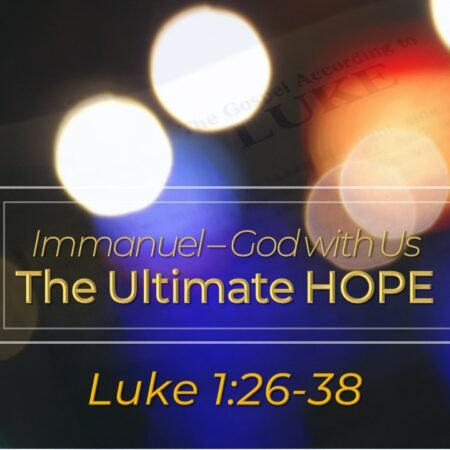Luke 1:26-38
1 Peter 1:10-12
Daniel 9:21-23
Luke 1:26-30
Isaiah 11:1-2
Isaiah 11:3-16
Luke 1:34
Luke 1:36-37
Romans 15:4-6
Biblical literacy produces biblical morality. Biblical illiteracy produces declining morals. With declining morals ULTIMATE HOPE IS FADING INTO DARKNESS.
Michael Heiser “The Unseen Realm”
“He could not depend on humans, though he had pledged himself to humanity’s preservation. He would no more forgo the role of his human imagers than he would destroy them. Because his original creation of humanity as his image had meant free-will agency, his kingdom must of necessity include humanity in its recovery and in rulership, else the Edenic vision would be undermined. There could be only one solution, though it would have two strategic deployments. God understood that only HE could be trusted with perfectly accomplishing his own will. He would therefore have to BECOME MAN AND, in addition, HE WOULD HAVE TO INHABIT THE HEARTS OF HIS CHILDREN. Residing in a tabernacle or temple was not enough. HE HAD TO INDWELL THOSE WHO CHOSE TO FOLLOW HIM.
Yahweh would send his Spirit to indwell his people. They could not be trusted with their freedom, but he would not eradicate it, nor would he leave them without enablement.
God’s plan to redeem humanity, reclaim the nations, and revive Eden depended on the INCARNATION OF THE SECOND YAHWEH figure and his subsequent death and resurrection. The story of the cross is the biblical-theological catalyst to God’s plan for regaining all that was lost in Eden. It couldn’t be emblazoned across the Old Testament in transparent statements.
It had to be expressed in sophisticated and cryptic ways to ensure that the powers of darkness would be misled. And it was. Even the angels did not know the plan.”
Mark Flynn “Forbidden Secrets of the Labyrinth” published 2014
“There is a religious institution wherein the members are the most devout and serious of any faith on Earth. Those who are a part of this institution unquestionably believe in a god that directs their activities and they look to this deity with the ultimate hope of gaining his favor.
They, unlike many of the people ascribed to the popular religions of today, have no doubt that their god lives and interacts with them. They see the favor their god bestows upon them. The riches and power gained through their piety actively demonstrates the reality of their god’s existence. The precepts of their secretive religion are contradictory to that of the Judeo-Christian religion (that values, above all, love for their fellow man). They consider the people outside of their group inferior creatures, unworthy of their god, but necessary for manipulation toward the completion of their final objective.
Through devotion, submission to the will of their god, and dedication to his secretive plan, they believe that they will achieve immortality and live in a coming golden age where their god will appear on Earth and rule them in a new paradise of his design.”
Chuck Swindoll
Any serious study of Jesus’ birth merits an accurate understanding of the one who bore Him. Unfortunately, more confusion surrounds the mother of the Christ child than the baby Himself! Thanks to the artist’ brush, the sculptor’s chisel and mallet, the author’s pen, and the well-meaning imagination of preachers, we know more about the Mary of dogma and legend than the real Mary of Scripture.
The Roman Catholic Church has not helped the situation by adding several unbiblical doctrines to its teaching on Mary. These include:
“Immaculate Conception,” the notion that Mary was born without a fallen sin nature, free from original sin.
“Perpetual Virginity,” which insists that Mary remained a virgin her entire life.
“Bodily Assumption,” the belief that Mary never succumbed to death but was taken directly into heaven in bodily form.
By adding one Mary-exalting dogma to another, the Roman Catholic Church now regards Mary as a co-mediator (or “mediatrix”) alongside her Son, Jesus Christ. In the words of Pope John Paul II, “In union with Christ and in submission to him, she collaborated in obtaining the grace of salvation for all humanity.”
Protestants during the Reformation and through the first several centuries afterward reacted sharply to Catholic errors, pushing the pendulum too far to the other side. Fearing excessive veneration for Mary, they virtually ignored her, leaving many of us today ignorant about this remarkable woman of God. Fortunately, Luke took great care to preserve her perspective regarding her role in the greatest event in history.”

